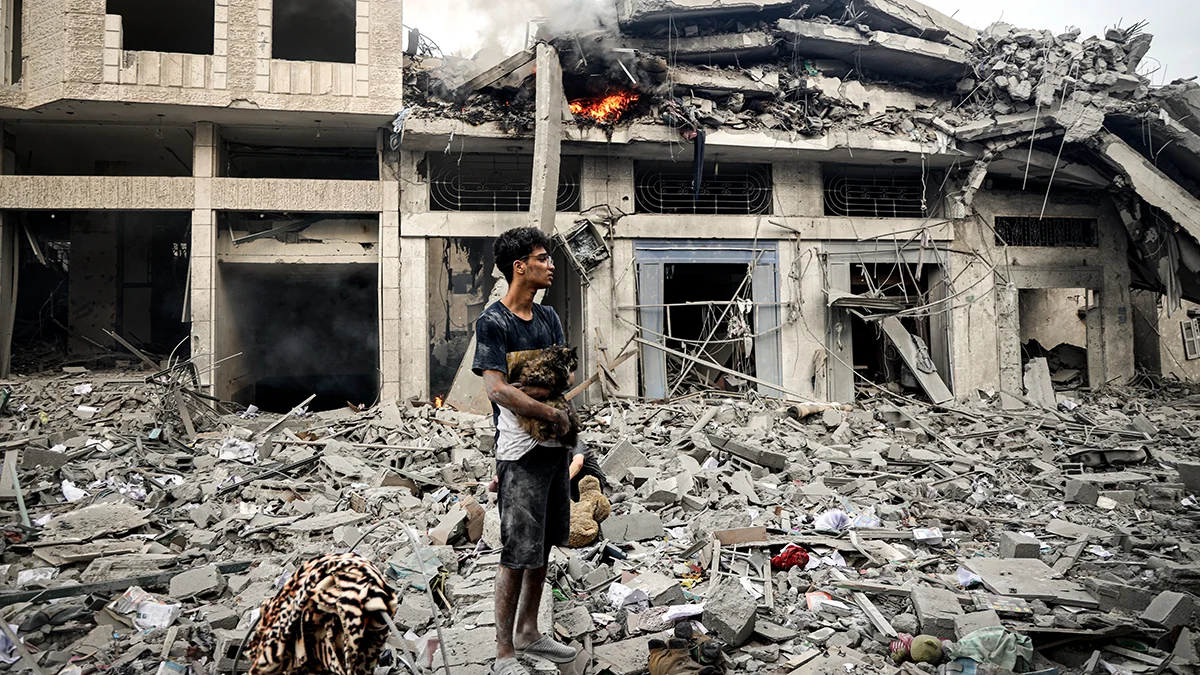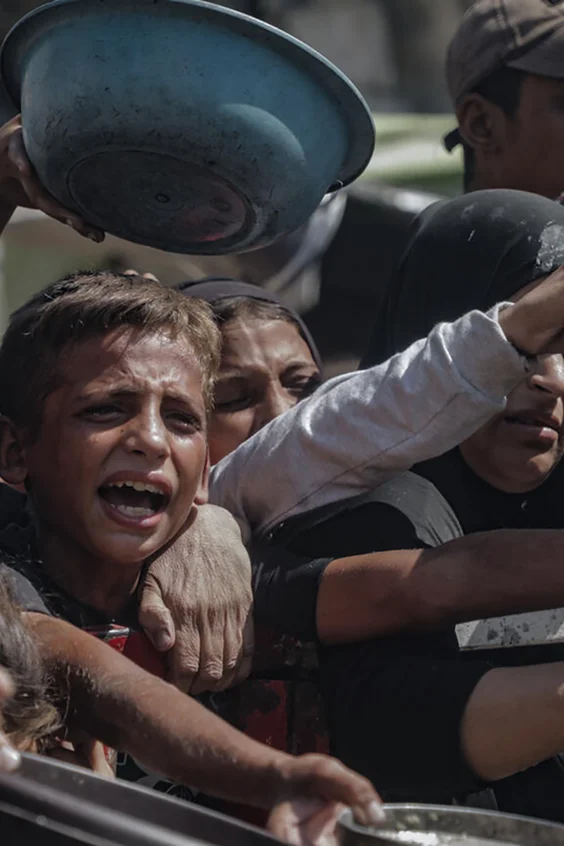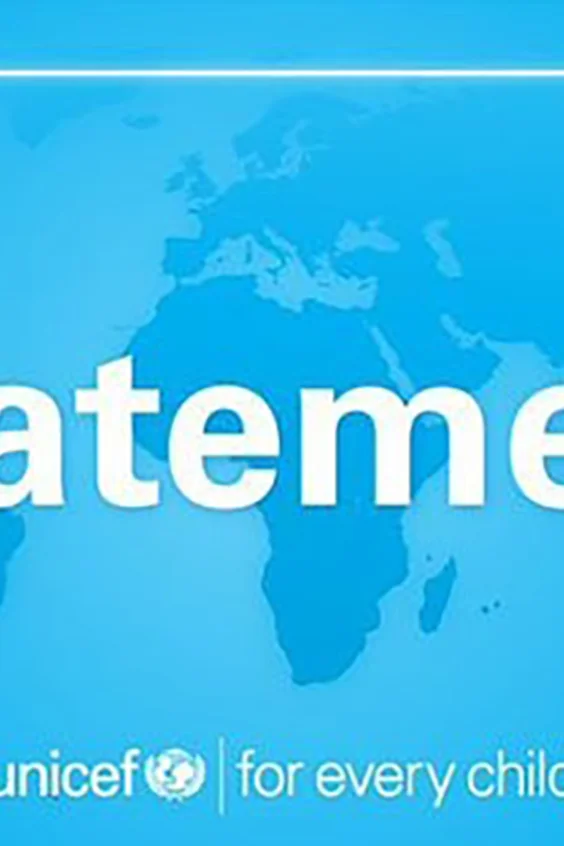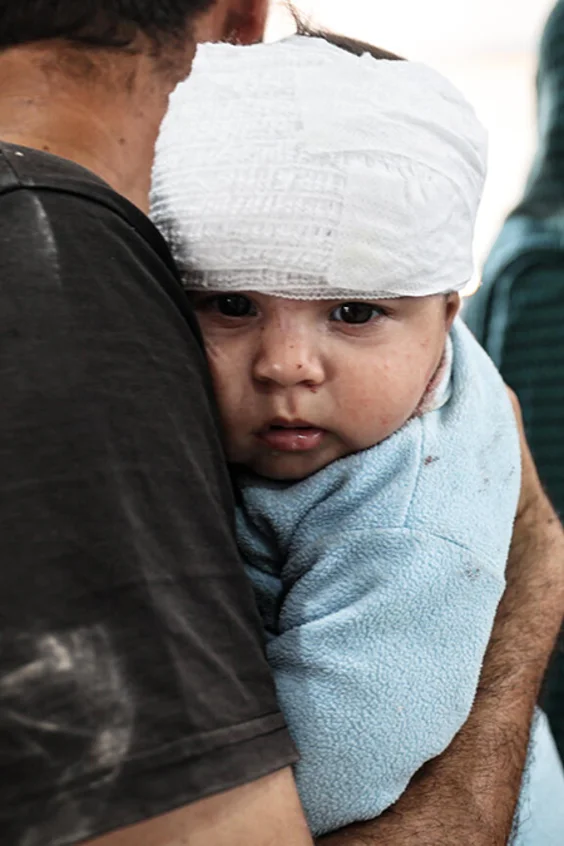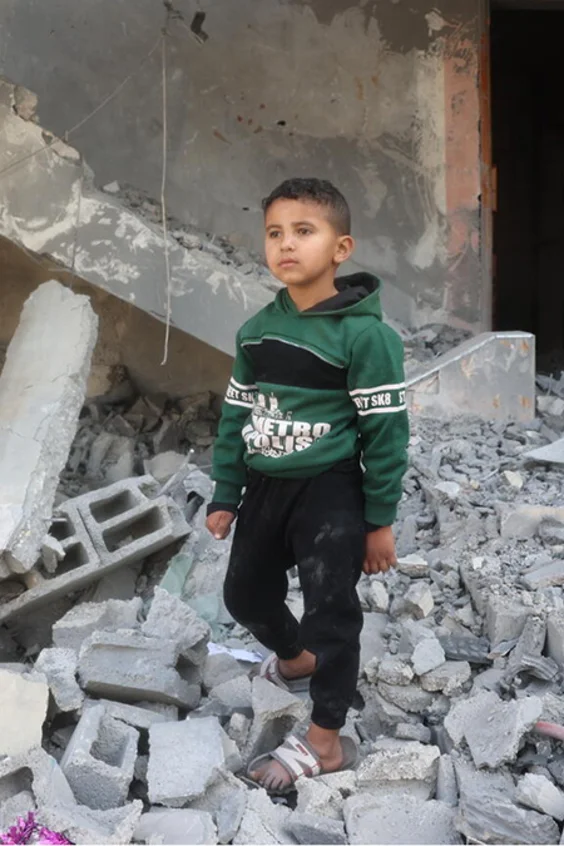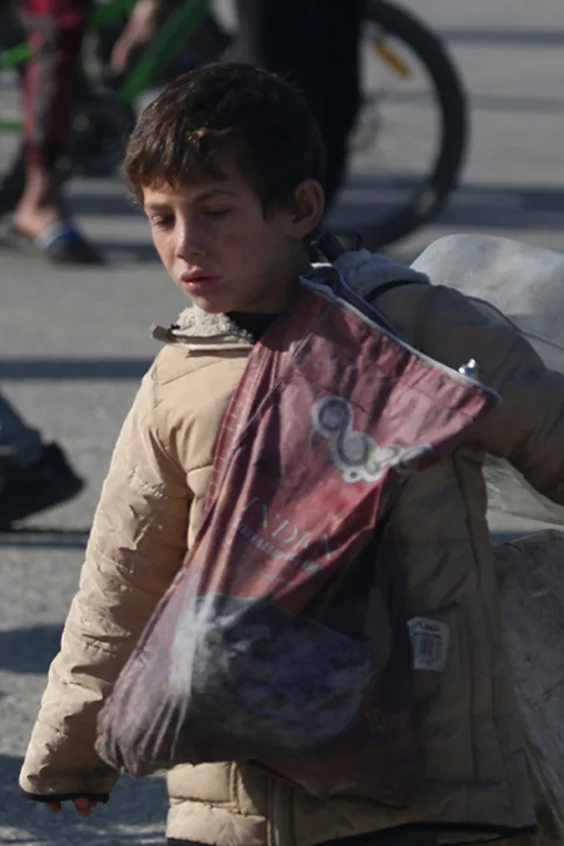Here you can find the latest developments on the humanitarian situation in the Middle East conflict.
+ + + Update 04 November 2023 + + +
Women, children and newborns in Gaza are disproportionately bearing the burden of the escalation of hostilities in the occupied Palestinian territory, both as casualties and in reduced access to health services, warn the United Nations Children's Fund (UNICEF), the United Nations Relief and Works Agency for Palestine Refugees in the Near East (UNRWA), the United Nations sexual and reproductive health agency (UNFPA), and the World Health Organization (WHO).
As of 3 November, according to Ministry of Health data, 2326 women and 3760 children have been killed in the Gaza strip, representing 67% of all casualties, while thousands more have been injured. This means that 420 children are killed or injured every day, some of them only a few months old.
The bombardments, damaged or non-functioning health facilities, massive levels of displacement, collapsing water and electricity supplies as well as restricted access to food and medicines, are severely disrupting maternal, newborn, and child health services. There are an estimated 50 000 pregnant women in Gaza, with more than 180 giving birth every day. Fifteen per cent of them are likely to experience pregnancy or birth-related complications and need additional medical care.
These women are unable to access the emergency obstetric services they need to give birth safely and care for their newborns. With 14 hospitals and 45 primary health care centres closed, some women are having to give birth in shelters, in their homes, in the streets amid rubble, or in overwhelmed healthcare facilities, where sanitation is worsening, and the risk of infection and medical complications is on the rise. Health facilities are also coming under fire – on 1 November Al Hilo Hospital, a crucial maternity hospital, was shelled.
Maternal deaths are expected to increase given the lack of access to adequate care. The psychological toll of the hostilities also has direct – and sometimes deadly – consequences on reproductive health, including a rise in stress-induced miscarriages, stillbirths and premature births.
Prior to the escalation, malnutrition was already high among pregnant women, with impacts on childhood survival and development. As access to food and water worsens, mothers are struggling to feed and care for their families, increasing risks of malnutrition, disease and death.
The lives of newborns also hang by a thread. If hospitals run out of fuel, the lives of an estimated 130 premature babies who rely on neonatal and intensive care services will be threatened, as incubators and other medical equipment will no longer function.
Over half of the population of Gaza is now sheltering in UNRWA facilities in dire conditions, with inadequate water and food supplies, which is causing hunger and malnutrition, dehydration and the spread of waterborne diseases. According to initial assessments by UNRWA, 4600 displaced pregnant women and about 380 newborns living in these facilities require medical attention. Already more than 22 500 cases of acute respiratory infections have been reported along with 12 000 cases of diarrhoea, which are particularly concerning given the high rates of malnutrition.
Despite the lack of sustained and safe access, UN agencies have dispatched life-saving medicines and equipment to Gaza, including supplies for newborns and reproductive health care. But much more is needed to meet the immense needs of civilians, including pregnant women, children and newborns. Humanitarian agencies urgently need sustained and safe access to bring more medicines, food, water and fuel into Gaza. No fuel has come into the Gaza Strip since 7 October. Aid agencies must receive fuel immediately to be able to continue supporting hospitals, water plants and bakeries.
An immediate humanitarian pause is needed to alleviate the suffering and prevent a desperate situation from becoming catastrophic.
All parties to the conflict must abide by their obligations under international humanitarian law to protect civilians and civilian infrastructure including health care. All civilians, including the hostages currently held in Gaza, have the right to health care. All hostages must be released without delay or conditions.
In particular, all parties must protect children from harm and afford them the special protection to which they are entitled under international humanitarian and human rights laws.
We are currently receiving many queries about the situation of the children in the Middle East and the work we are doing there. You can find the answers here:
UNICEF condemns the violence in the strongest possible terms and is working to ensure the protection of all children. UNICEF appeals to all parties to comply with international humanitarian law and therefore calls for:
- An immediate ceasefire and end to the violence;
- The immediate and unconditional release of all hostages;
- The opening of all border crossings to Gaza and safe, permanent and unrestricted access for humanitarian aid, including water, food, medical supplies and fuel;
- Respect for and protection of the civilian infrastructure such as housing, electricity, water, healthcare and sanitary facilities;
- The provision of medical care to prevent the outbreak of disease and ensure proper care for the sick and wounded;
- In urgent cases, the evacuation of patients from Gaza or the provision of important healthcare services on site.
Before the latest outbreak of violence in October, some 2.1 million people in Gaza and the West Bank, including 1.1 million children, depended on humanitarian aid. UNICEF has been working throughout Palestine for many years and is dedicated to providing access to services and protection for all children.
During the current crisis, the UNICEF staff are working to meet the urgent needs of the children in all of Gaza, but access is becoming ever more difficult and dangerous. UNICEF staff are continuing their efforts in the south of Gaza to provide humanitarian aid to children, e.g. clean drinking water, medical care and psychosocial support.
UNICEF has been active in Israel since 2009 through the Israeli Fund for UNICEF. This is a national UNICEF committee, comparable to the Committee for UNICEF Switzerland and Liechtenstein. In high-income countries such as Israel, Switzerland and Liechtenstein, the state itself takes care of the program work done or supported by UNICEF in low-income countries. Such countries therefore do not mandate UNICEF to develop and implement programs for children. The work of the national committees focuses on raising funds and providing support in implementing the Convention on the Rights of the Child at the political level rather than at a program level. This is why UNICEF is not calling for donations for children living in Israel.
Past updates:
“The scenes of carnage coming out of Jabaliya camp in the Gaza Strip following attacks yesterday and again today are horrific and appalling.
While we do not yet have estimates of the toll the attack has taken on children, people’s homes have been leveled, hundreds apparently injured and killed, with many children reportedly among the casualties.
These two attacks follow 25 days of ongoing bombardment that have reportedly resulted in more than 3,500* children killed – not including today’s deaths – and over 6,800* children reportedly injured. This would be over 400* children killed or injured per day, for 25 straight days. This cannot become the new normal.
Refugee camps, settlements for the internally displaced, and the civilians inhabiting them are all protected under international humanitarian law (IHL). Parties to conflict have an obligation to respect and protect them from attack.
Attacks of this scale on densely populated residential neighborhoods can have indiscriminate effects and are completely unacceptable. Refugees and internally displaced people are protected under international humanitarian law. Parties to conflict have an obligation to protect them from attack.
Children have endured too much already. The killing and captivity of children must stop. Children are not a target.
UNICEF reiterates its urgent call to all parties to the conflict for an immediate humanitarian ceasefire, to ensure the protection of all children, and for safe and unimpeded humanitarian access to deliver lifesaving aid at scale across the Gaza Strip, according to International Humanitarian Law.”
*These figures could not be verified independently.
Over the past 18 days, the Gaza Strip has borne witness to a devastating toll on its children, with a reported 2360* fatalities and a reported 5364* injuries due to unrelenting attacks, or more than 400* children reportedly either killed or injured daily. Additionally, more than 30 Israeli children reportedly have lost their lives, and dozens remain in captivity within the Gaza Strip. The 18-day period is the deadliest escalation of hostilities in the Gaza Strip and Israel that the UN has witnessed since 2006.
Almost every child in the Gaza Strip has been exposed to deeply distressing events and trauma, marked by widespread destruction, relentless attacks, displacement, and severe shortages of essential necessities such as food, water, and medicine.
“The killing and maiming of children, abduction of children, attacks on hospitals and schools, and the denial of humanitarian access constitute grave violations of children's rights,” said Adele Khodr, UNICEF Regional Director for the Middle East and North Africa. “UNICEF urgently appeals on all parties to agree to a ceasefire, allow humanitarian access and release all hostages. Even wars have rules. Civilians must be protected – children particularly – and all efforts must be made to spare them in all circumstances.”
The West Bank has also witnessed an alarming surge in casualties, with nearly a hundred Palestinians reportedly losing their lives, including 28* children, and at least 160* children reportedly sustaining injuries. Even before the tragic events of October 7 2023, children in the West Bank were already grappling with the highest levels of conflict-related violence in two decades, resulting in the loss of 41 Palestinian children and six Israeli children's lives so far this year.
“The situation in the Gaza Strip is a growing stain on our collective conscience. The rate of death and injuries of children simply staggering,” said Khodr. “Even more frightening is the fact that unless tensions are eased, and unless humanitarian aid is allowed, including food, water, medical supplies and fuel, the daily death toll will continue to rise.”
Fuel is of paramount importance for the operation of essential facilities such as hospitals, desalination plants, and water pumping stations. Neonatal intensive care units house over 100 newborns, some of whom are in incubators and rely on mechanical ventilation, making an uninterrupted power supply a matter of life and death.
The entire population of the Gaza Strip, comprising nearly 2.3 million people, is facing a dire and pressing lack of water, which poses grave consequences for children, roughly 50 per cent of the population. The majority of water systems have been severely impacted or rendered non-operational due to a combination of factors, including fuel shortages and damage to vital production, treatment, and distribution infrastructure. Currently, the water production capacity is a mere 5 per cent of its usual daily output.
Vulnerable population groups are resorting to non-potable water sources, including high-salinity and brackish-quality water from agricultural wells. To compound the issue, the five Gaza wastewater treatment plants have ceased operations, primarily because of fuel shortages, leading to over 120 000 cubic meters of wastewater being discharged into the sea.
"The footage of children being rescued from beneath the rubble, injured and in distress, while trembling in hospitals as they await treatment, portrays the immense horror these children are enduring. But without humanitarian access, the deaths from attacks could be the tip of the iceberg," said Khodr. "The death toll will increase exponentially if incubators start to fail, if hospitals go dark, if children continue to drink unsafe water and have no access to medicine when they get sick.”
To respond to the dire situation for children in the Gaza Strip, UNICEF is calling for:
- An immediate humanitarian ceasefire.
- All access crossings into Gaza to be opened for a safe, sustained and unimpeded access of humanitarian aid, including water, food, medical supplies, and fuel.
- Urgent medical cases in Gaza to be allowed to leave or to be able to receive critical health services.
- Respect and protection for civilian infrastructure such as shelters and schools, and health, electric, water and sanitation facilities, to prevent loss of civilian and children’s lives, outbreaks of diseases, and to provide care to the sick and wounded.
*These figures could not be verified independently.
“I am horrified by the reported deaths and injuries of children and women following an attack on the Al Ahli Hospital in the Gaza Strip this evening. While details are still emerging and bodies are still being counted, the scenes on the ground are devastating.
This underscores the deadly impact this ongoing war is having on children and families. In just 11 days, hundreds of children have tragically lost their lives – not including today’s deaths – and thousands more injured, and over 300,000* children displaced from their homes.
Attacks on civilians and civilian infrastructure, such as hospitals, are unacceptable and must cease now. UNICEF reiterates its urgent plea for an immediate cessation of hostilities, ensuring the protection of children from harm and facilitating the safe and timely access of humanitarian aid to children in need.
Every child, everywhere deserves peace.”
– Statement by UNICEF Executive Director Catherine Russell
*These figures could not be verified independently.
At least 1,300 Israelis were killed, and more than 4,121* wounded. At least 2,808* Palestinians were reportedly killed, including 724* children and more than 9,938* wounded, including more than 2,450* children. These numbers are expected to change as the crisis evolves.
Further UNICEF is closely monitoring the reported incidents of child abductions in southern Israel and the Gaza Strip. UNICEF reiterates that any abduction of children constitutes a grave violation and calls for the immediate release and protection of any child in custody.
An estimated 339,000* individuals have been displaced within Gaza, due to fear, safety issues and destruction of homes. Civilian infrastructure including schools, hospitals and shelters are under threat. Electricity supplies to the Gaza Strip have been severely reduced, limiting power to three to four hours daily. In line with international humanitarian law, it is imperative that essential services are respected and safeguarded at all times. The majority are seeking refuge in 92 schools run by the United Nations Relief and Works Agency for Palestine Refugees in the Near East. In Israel, children and families who were forced to leave their homes are seeking shelter in designated emergency shelters and schools.
As the conflict escalates, it is crucial to remember that children, regardless of their background, are the most vulnerable and prone to trauma. Palestinian or Israeli, they are first and foremost children – who deserve protection, care and a chance to live in peace. UNICEF's plea for the immediate end of hostilities and unconditional protection of children from harm echoes the urgency of the situation.
Despite the challenging humanitarian and security situation, UNICEF is on the ground, working with partners on the ground in the Gaza Strip. The evolving crisis has necessitated an additional funding need of $17 million to deliver immediate humanitarian support such as medical supplies, fuel, and mental health and psychosocial support.
In high-income countries, such as Israel, the State itself performs the programmatic functions that UNICEF undertakes or supports in lower income countries. UNICEF programmes are not required. The Israeli Fund for UNICEF (Israel National Committee) was established in 2009 and works to promote and raise awareness of children’s rights in Israel and to raise funds for UNICEF’s lifesaving work across the world. Besides fundraising on behalf of UNICEF, IFU advocates for the promotion and protection of children’s rights in Israel through child rights education (CRE), the Child Friendly Cities Initiative (CFCI) and child participation.
*These figures could not be verified independently.
Hundreds of thousands of children and their families have started fleeing northern Gaza today ahead of imminent larger-scale attacks. It follows days of bombardments of Gaza after the brutal attacks of 7 October. Nearly a week into the war, hundreds of children have been reportedly killed, aand thousands more reportedly injured.
UNICEF is calling for an immediate ceasefire as 1.1 million people — nearly half of them children — have been warned to move out, ahead of what is expected to be a widescale military assault into one of the most densely populated places on earth.
Children and families in Gaza have practically run out of food, water, electricity, medicine and safe access to hospitals, following days of hostilities and cuts to all supply routes.
“The situation is catastrophic, with unrelenting bombing and a massive increase in the displacement of children and families. There are no safe places,” said UNICEF Executive Director Catherine Russell. “An immediate ceasefire and humanitarian access are the top priorities to allow much needed aid to children and families in Gaza. We need an immediate humanitarian pause to ensure unhindered and safe access to children in need, no matter who they are or where they are. There are rules of war. Children in Gaza need lifesaving support and every minute counts.”
Homes and critical infrastructure lie in ruin, and over 423,000* people have already fled their homes. Some have taken shelter in schools or hospitals, with some of schools damaged in attacks. Gaza’s two main hospitals, already running out of fuel and overflowing with injured civilians, have also been warned to move patients and staff south in just hours.
Right now, there is practically no way out of Gaza for the civilian population.
UNICEF staff have continued to respond to the critical needs of children across the Gaza Strip, but access is becoming increasingly difficult and dangerous. Humanitarians have also been warned to move out of Gaza city, but UNICEF staff will stay in southern Gaza to continue to provide support for children in need.
UNICEF has distributed nearly all its prepositioned supplies, and worked to keep the only functioning desalination plant in the entire Gaza Strip running in much-reduced capacity. The plant provides safe water for 75,000 people, but without fuel it could come to a halt soon. Medical supplies and medicines have also been provided to hospitals, but given the number of injuries, hospital beds and essential medicine—including anesthetics—are quickly running out.
“A child is a child. Children everywhere must be protected at all times and must never come under attack,” said Russell. “We reiterate the United Nations Secretary-General’s call to rescind the order for over one million Palestinian civilians to leave northern Gaza and to take all possible steps to provide their safety and protection. Every child deserves no less.”
*These figures could not be verified independently.
“Hundreds & hundreds of children have been killed and injured. Every hour in Gaza the number of children killed rises. The killing of children must stop.
The images and stories are clear: children with horrendous burns, mortar wounds, and lost limbs. And hospitals are utterly overwhelmed to treat them. Yet the numbers keep rising.
Israeli children being held hostage in Gaza must be safely and immediately reunited with their families and loved ones.
The humanitarian situation has reached lethal lows, and yet all reports point to further attacks. Compassion – and international law – must prevail. UNICEF is calling for an immediate cease fire as 1.1 million people – nearly half of them children - have been warned to move out of the way ahead of a what is expected to be a ground assault on one of the most densely populated places on the planet, but with nowhere safe for civilians to go.
Children and families in Gaza have practically run out of food, water, electricity, medicine and safe access to hospitals, following days of air strikes and cuts to all supply routes. Gaza’s sole power plant ran out of fuel Wednesday afternoon, shutting down electricity, water and wastewater treatment. Most residents can no long get drinking water from service providers or household water through pipelines. At least six water wells, three water pumping stations, one water reservoir, and one desalination plant serving more than 1million people have been damaged by airstrikes.
Humanitarians must be able to safely access children and their families with lifesaving services and supplies – wherever they may be. In every war, the ones who suffer the most are children. This is tragically true today.”
– Statement by UNICEF Spokesperson James Elder
“The ongoing surge of conflict-related violence continues to take a horrendous toll on the lives of children and their families in Israel and the State of Palestine. Nothing justifies the killing, maiming or abduction of children. Any delay in bringing an end to the conflict will inevitably result in more devastating consequences for children.
According to reports, hundreds of Israeli and Palestinian children have been killed and many more injured in the last 72 hours. The killing and maiming of children is a grave violation and willful killing is a serious breach of International Humanitarian Law. We call on all parties not to target children and take all necessary measures to ensure their protection during hostilities.
In addition, there are reports of the abduction of Israeli children to the Gaza Strip. The abduction of children by any party to the conflict constitutes a grave violation and hostage-taking is prohibited by International Humanitarian Law in all circumstances. UNICEF calls for the immediate and safe release of all hostages.
As of yesterday, according to the “United Nations Relief and Works Agency for Palestine Refugees in the Near East” (UNRWA), there are more than 187,000 newly displaced people in Gaza, many of the sheltering at UNRWA schools, and many of them children. Some of the facilities sheltering displaced families in Gaza, including schools, have sustained damages.
Hundreds of thousands of children are affected by the escalation of hostilities in Gaza and are in desperate need of humanitarian assistance and protection. Before this renewed violence, 1.1 million children were already in need of humanitarian aid in the Gaza Strip and the West Bank – accounting for approximately half the child population.
We are extremely alarmed about measures to cut electricity food, water and fuel from entering Gaza. This will add another layer of suffering to the existing catastrophe faced by families in Gaza. Depriving children of access to food and essential services puts their lives at risk, as do attacks on civilian areas and infrastructure – including health centers, schools and water and sanitation systems. It is imperative that all parties refrain from further violence and attacks on civilian infrastructure, including schools, health centers and shelters.
In the Gaza Strip, UNICEF and its partners are on the ground delivering immediate humanitarian support, including medical supplies, fuel as well as mental health and psychosocial support. With the humanitarian situation rapidly deteriorating, humanitarian actors must be able to safely access children and their families with lifesaving services and supplies – wherever they may be.
UNICEF is calling for immediate cessation of hostilities and reminding parties of their obligations under International Humanitarian law to afford special protection to children. Every single child, no matter who or where they are, must be protected.”
– Statement by UNICEF Spokesperson James Elder
“Nothing justifies the killing, maiming or abducting of children – grave rights violations which UNICEF wholeheartedly condemns. Yet less than 72 hours after the outbreak of horrific violence in Israel, reports indicate that grave rights violations against children are rampant. Many children have been killed or injured, while countless others have been exposed to the violence.
UNICEF calls on armed groups, or those responsible, for the immediate and safe release of any children being held hostage in Gaza so that they can be reunited with their families or caregivers. And we call on all parties to protect children from harm, in accordance with international humanitarian law.
I am also deeply concerned about measures to block electricity and prevent food, fuel and water from entering Gaza, which may put the lives of children at risk.
It is imperative that all parties refrain from further violence and attacks on civilian infrastructure. With the humanitarian situation rapidly deteriorating, humanitarian actors must be able to safely access children and their families with lifesaving services and supplies – wherever they may be. I remind all parties that in this war, as in all wars, it is children who suffer first and suffer most.”
– Statement by UNICEF Executive Director Catherine Russell
“I am deeply concerned for the wellbeing of children in Israel and the State of Palestine.
With hundreds of civilians reportedly killed or injured, we are closely monitoring the situation for reports of grave rights violations committed against children.
Today’s events continue the trend of spikes in violence that have wracked Israel and the State of Palestine, leaving 199* children dead and more than 2,800* injured in the last three years.
UNICEF calls for the immediate cessation of hostilities, and for all parties to protect children from harm and afford them the special protection to which they are entitled, in accordance with their obligations under international humanitarian law.
More than anything, the children of Israel and the State of Palestine need a lasting political solution to the crisis, so that they can grow up in peace and free from the shadow of violence.”
– Statement by UNICEF Executive Director Catherine Russell
